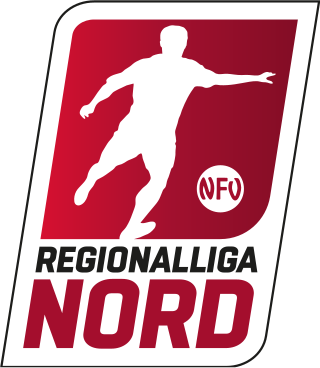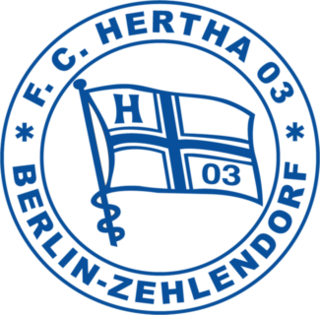
Fußball-Club Augsburg 1907 e. V., commonly known as FC Augsburg or Augsburg, is a German professional football club based in Augsburg, Bavaria. FC Augsburg play in the Bundesliga, the top tier of the German football league system. The team was founded as Fußball-Klub Alemania Augsburg in 1907 and played as BC Augsburg from 1921 to 1969. With over 18,800 members, it is the largest football club in Swabian Bavaria.

The 2. Bundesliga is the second division of professional football in Germany. It was implemented 11 years after the founding of the Fußball-Bundesliga as the new second division for professional football. The 2. Bundesliga is ranked below the Bundesliga and above the 3. Liga in the German football league system. All of the 2. Bundesliga clubs take part in the DFB-Pokal, the annual German Cup competition. A total of 127 clubs have competed in the 2. Bundesliga since its foundation.

The Regionalliga Nord is the fourth tier of the German football league system in the states of Lower Saxony, Schleswig-Holstein, Bremen and Hamburg. It is one of five leagues at this level, together with the Regionalliga Bayern, Regionalliga Nordost, Regionalliga Südwest and the Regionalliga West. Until the introduction of the 3. Liga in 2008 it was the third tier.

The 3. Liga is a professional association football league and the third division in Germany. In the German football league system, it is positioned between the 2. Bundesliga and the fourth-tier Regionalliga.

Fußball-Club Würzburger Kickers e.V. is a German association football club playing in Würzburg, Bavaria. In pre-World War II football, the club competed briefly at the highest level in the Bezirksliga Bayern, and during the war, in the Gauliga Bayern. Post-war, it made a single appearance in professional football in the southern division of the 2. Bundesliga in 1977–78. After a long stint in amateur football, dropping as low as the seventh tier, the club began a recovery. The Kickers reached professional football again in 2014–15 after winning promotion to the 3. Liga and the following season were promoted to the 2. Bundesliga.

The Under 19 Bundesliga is the highest level in German Under 19 football. It was created in 2003 and is divided in three divisions with 14 teams each. The winner of each divisions and the second-placed team from the Süd/Südwest division join the play-offs for the German U19 champions.
The Promotion to the 2. Bundesliga are an end-of-season competition, held annually to determine the clubs that were promoted from the Amateurligas, later the Amateur Oberligas to the 2. Bundesligas. It is necessary because there are more third division champions than promotion spots available.

The Regionalliga Süd was the second-highest level of the German football league system. It existed in the south of West Germany from 1963 until the formation of the 2. Bundesliga in 1974. It covered the three states of Bavaria, Baden-Württemberg and Hesse.

The Regionalliga Südwest was the second-highest level of the German football league system in the southwest of West Germany from 1963 until the formation of the 2. Bundesliga in 1974. It covered the states of Saarland and Rheinland-Pfalz.

The 2. Bundesliga Süd was the second-highest level of the West German football league system in the south of West Germany from its introduction in 1974 until the formation of the single-division 2. Bundesliga in 1981. It covered the southern states of Saarland, Rhineland-Palatinate, Baden-Württemberg, Hesse and Bavaria.

The 2. Bundesliga Nord was the second-highest level of the West German football league system in the north of West Germany from its introduction in 1974 until the formation of the single-division 2. Bundesliga in 1981. It covered the northern states of North Rhine-Westphalia, Lower Saxony, Bremen, Hamburg, Schleswig-Holstein and the city of West Berlin.

The Oberliga Nord was the fourth tier of the German football league system in the north of Germany. It covered the states of Lower Saxony, Bremen, Hamburg and Schleswig-Holstein. With the introduction of the 3. Liga, the league ceased to exist from 2008.

The Hertha Zehlendorf is a German football club from the suburb of Zehlendorf in Berlin.

The Under 17 Bundesliga is the highest level of play in German football for male juniors between the ages of 15 and 17. It was formed in 2007 and operates in three regional divisions with 14 clubs each. At the end of season, the three league winners and one of the runners-up determine the German champions for this age group.
The 1999–2000 Regionalliga was the sixth season of the Regionalliga as the third tier of German football. It was also the last season to be competed in four divisions. Teams were not only competing for promotion to the 2. Bundesliga, but also to qualify for the new two-division Regionalliga.

The Regionalliga Bayern,, is the highest association football league in the state of Bavaria and the Bavarian football league system. It is one of five Regionalligas in German football, the fourth tier of the German football league system, below the 3. Liga.

The Regionalliga Südwest is the fourth tier of the German football league system in the states of Hesse, Baden-Württemberg, Rhineland-Palatinate and Saarland. It is one of five leagues at this level, together with the Regionalliga Bayern, Regionalliga Nordost, Regionalliga Nord and the Regionalliga West.
The Introduction of the 2. Bundesliga was the step of establishing a professional second tier association football league in Germany in 1974. The new league, the 2. Bundesliga, played its first season in 1974–75 and continues to be the second-highest league in the country. Its introduction reduced the number of second divisions in Germany from five to two and the number of teams at this level from 83 to 40. It eliminated the necessity of having a promotion round at the end of the season to determine the two teams promoted to the Bundesliga.

The 1973–74 Regionalliga was the eleventh season of the Regionalliga, the second tier of the German football league system. The league operated in five regional divisions, Berlin, North, South, Southwest and West. The five league champions and runners-up then entered a promotion play-off to determine the two clubs to move up to the Bundesliga for the next season. Northern German and Berlin champions Eintracht Braunschweig and Tennis Borussia Berlin were promoted.

The 1972–73 Regionalliga was the tenth season of the Regionalliga, the second tier of the German football league system. The league operated in five regional divisions, Berlin, North, South, Southwest and West. The five league champions and all five runners-up, at the end of the season, entered a promotion play-off to determine the two clubs to move up to the Bundesliga for the next season. Both promotion spots went to the Regionalliga West with Rot-Weiß Essen and Fortuna Köln promoted.












